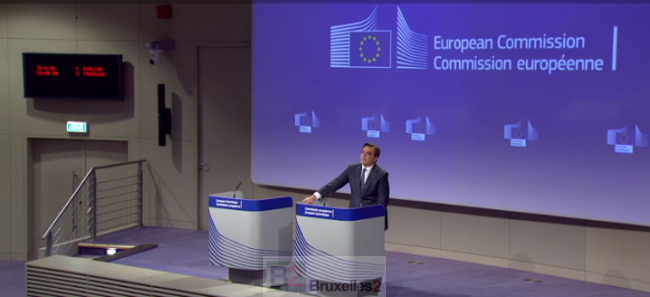When the Commission lectures journalists… and vice versa

(B2) The European Commission, through its spokesperson, Margaritis Schinas, declined on Friday (June 15) to comment expressly on the German position (in particular of the CSU) on the reception of refugees. Beyond the substantive issues, it was above all a question of defining the role of the Commission, its political aura and its responses to questions from the press.
The spokesperson preferred to refer to Article 13 of the Dublin Regulation, leaving " free " the journalists " to interpret and comment on it ". A position which had the art of annoying and which is at the limit of false information.
To comment or not to comment on a Member State's position, that is the question
The lack of response from the European Commission gave rise to some heated exchanges. Our Italian colleague Lorenzo Consoli then took the floor, summing up with his pugnacity, the state of mind of the press room:
« You give us no answer. Why are you paid? It's not that. [...] Article 13 means nothing in what you read. [The question is simple] Can a Member State refuse to take in a refugee who comes from another Member State? Yes or no ? If you can't answer that...because you're afraid of Germany, you can't be the spokesperson. [...] You are the Commission which defends the general interest of the European Union, guardian of the Treaties. »
The spokesperson's justification for this lack of response is interesting. Whether responding with Michael Stabenow (FAZ) or with Jurek Kuczkiewicz (Le Soir), the spokesperson does not deviate from his line, setting a limit to the European Commission's autonomy of speech vis-à-vis the Member States.
“Our response is Article 13 of the Dublin Agreement. This is the answer. Now it's up to you to do the interpretation. It is your prerogative, your right and even your duty I would say. »
« The answers we give are based on the law, [on] what is applicable. You ask us to make political, interpretative interpretations of the articles and to try to place them in a national political context. I do not want to do it. »
« We cannot engage in interpretations or politico-national positions that suit everyone. We never did. And we never will. »
Note: This position is very interesting. We will see if, with regard to other situations, concerning other Member States, the European Commission will abstain from any comment.
Where does the text read in the gallery come from?
Dispassionately, B2 sought to find out more by taking up the text read by the spokesperson.
“When it come to EU legislation, under EU law, if a person express the wish to apply international protection, Members states must carry out the procedure of determining the Member state responsible for examining the application in line with dublin regulation. »
First observation: this text does not exist anywhere in the Dublin Regulation. We tried to find out more.
Second observation: this text is not a legal text. It is mostly about what is called in terms of communication 'a line to take', a line of defense to respond to 'a little insistent' journalists. A line extracted, in fact (according to our research), from the position taken by the European Commission to present the reform of the asylum system and the Dublin regulation.
Third observation: the European position cannot be summed up in a few lines. In fact, several articles must be read in the Dublin regulation: article 13 in particular in its entirety, which must be read in conjunction with article 3... and the other articles of the regulation. A point confirmed to us by an expert on the matter.
Fourth observation: to deduce what European law says, one must not only find the text, one must understand it, analyze it, compare it with the other points of the text. We have tried to do so (Read our analysis: Who is responsible for the asylum application. Article 13 and the Dublin Regulation). This is not obvious...
Questioned by B2, at the following press briefing (Monday 18 June), the spokesperson for the Commission, Margaritis Schinas, admitted, somewhat embarrassed, that it was not really about Article 13 in itself. even but of gasoline " of text.
The knowledgeable and the ignorant
It can thus be concluded that the European Commission has not issued any precise element of response, allowing – as the spokesperson indicated – the press to interpret or comment. This information is completely useless. It is in fact only a pretext given for not answering. Moreover, it introduces a dichotomy between the spokesperson = the 'knowing' (or at least pretending to know) and the other, the journalist = 'the ignorant', who should know. A concept that is at odds with the general interest and the service to the public that the European Commission should fulfill.
(Nicolas Gros-Verheyde)
